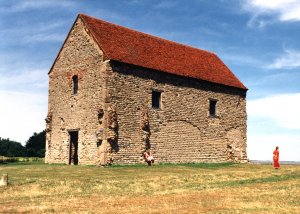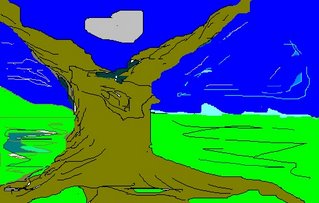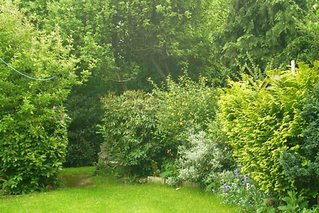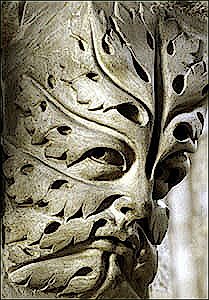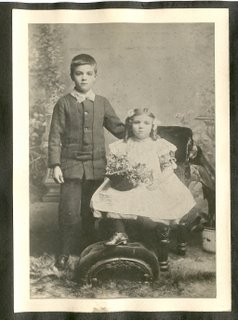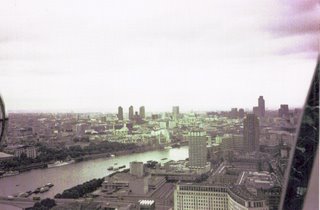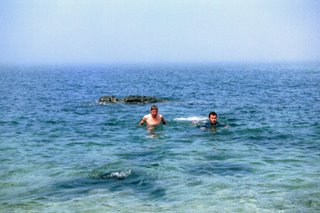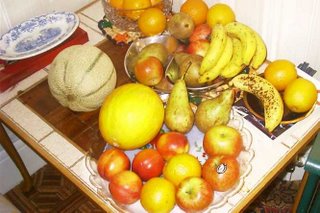Monday, November 27, 2006
St Peter's on the Wall
St., Peter’s stands,
Full of centuried age,
In the midst of dreaming acres.
Surrounding the ancient stones,
Under green banks, are the remains
Of an even earlier occupation.
Othona’s Roman fort, guarding
The Saxon shore faced the same rushing waves.
The same salt-laden gales
Which sang their wild song
Chill the ears of pilgrims
Of the present day as they tread
The path to antiquity and
The time-worn stones of sanctity.
Thursday, November 23, 2006
Sunday, November 05, 2006
Autumn
Crisp autumn mornings give me something of my childhood;
The chill in the air, the sun bright-shining,
Diamond-strung cobwebs on garden growth,
And dew-sparkling grass, touch some hidden cord
Which reaches back through time
To that distant happiness. They rouse the wish
To trample rustling leaves deeply lying in their
Red-gold masses under glorious trees,
Trees ripe for climbing in those far off days
Before the turmoil of newly attained adulthood
Swept away the child's world
Into the fine-wrought halls of memory.
Friday, November 03, 2006
Friday, August 25, 2006
I am making a start on this essay without any great idea as to how I am going to set about it. I think a list of woods that have all been a part of my life to a greater or lesser degree will do to begin with. Here we go.
HOCKLEY WOODS, ANCIENT WOODLAND IN ESSEX.
BECKNEY WOODS, ALSO IN HOCKLEY, PART OF PLUMBEROW.
SCRATCH WOODS, ANCIENT WOODLAND IN MIDDLESEX, PART OF THE ANCIENT FOREST OF MIDDLESEX.
MOAT MOUNT, ORNAMENTAL WOODLAND, MOSTLY PLANTED IN VICTORIAN TIMES.
BARN HILL, PART OF WHICH IS ANCIENT WOODLAND, AND PART ORNAMENTALLY PLANTED.
EPPING FOREST, PART OF A MUCH GREATER FOREST, IT NOW BELONGS TO THE PEOPLE OF LONDON. AMBERSBURY BANKS IS A FAVOURITE [PLACE WITHIN THE FOREST.
STRANS WOOD IN UPPER WHARFEDALE I HAVE KNOWN ONLY RECENTLY. IT IS SMALL BUT LOVELY, also STRID WOOD.
THORPE PERROW ARBORETUM, A MOST PEACEFUL PLACE VISITED ONCE BUT WELL REMEMBERED.
This will hopefully give me some inspiration with which make a start.
From an early age I have delighted in woodland. I suppose the earliest time I could have seen trees in large numbers would have been when I was taken by my mother to the park near our home in Highams Park. I was too young to remember this, there is just a vague memory of ducks on a lake, but it would have stayed in my subconscious, I suppose. We left Highams Park when I was four and moved to Hockley in Essex, where I lived till I was married.
This is where my conscious memories of woodland begin.
I was taken to Epping Forest on a Sunday school trip when I was around five or six years old. Unfortunately my main memory of this day is falling off a donkey. My foot being caught in a stirrup I was dragged along the ground, finishing up with a nasty graze on one of my arms. The trees took a second place that day!
As a young child Hockley woods played a great part in pleasurable outings of exploration. With young friends I wandered through the woods delighting in the great oak trees and the thickly grown remains of past coppicing. My Dad took me for walks and explained about the coppice cutting that had taken place, talks which stayed in my mind and was the beginning of my love of trees. Windflowers starred the ground early in the Spring, delicately stirring to the slightest breeze.
There were also huge ants, not so lovable. Their nests were mountains of tiny twigs and whatever else was suitable for them. They got in the way of picnics. I have an idea they were originally put there as food for pheasants. The pheasants were gone and so were the humans who preyed on them, but the ants were flourishing.
While going to Hockley Council School my friend, Jean, and I were allowed to have a picnic meal in the woods once a week, in the summer, of course. We sat in what I thought were old sand pits surrounded by trees, not far from the school, delighting in the short period of freedom in the school day. On other days of the week we went home for our dinner.
There was also the pleasure of eating the sweetest of chestnuts from the massive chestnut trees that grew near to the school playground. There was holly to collect at Christmas time, holly that seemed all the more festive due to the search in the depths of the woods for bushes with berries.
I shall insert a poem here, one that I wrote which I hope gives something of the special feeling that woods had in my childhood heart.
Woodland
How I loved to climb a tree,
To sit up the top of my leafy palace,
Queen of my glorious woodland,
A magical faery world.
A stream ran rippling through the wood,
Steeply banked and deeply pooled,
Bordered with flowers according to their season.
Windflowers, celandines starred the banks with Spring
And my memory with enchantment.
Beckney Woods is in Hockley, overlooking the site of the battle in Canewdon between Edmund Ironside, the son of Aethelred the Unready, and Canute, the Dane. This was often a place for a family walk after Sunday tea. This wood was at its best in Spring when the leaves were pale green and pleated, and the bluebells were even more beautiful than I have seen elsewhere.
Ambersbury Banks in Epping Forest is a place that holds a fascination for me. Maybe it was the place where Boudicca and her followers fought their last battle, maybe it was not. More likely is the theory that it was an Iron Age hill fort that had nothing to do with the Queen of the Iceni. Whatever is the truth of the matter, I feel an atmosphere of the past. Who were the people who built this embankment? What would they think of us, people of modernity? Do their ghosts haunt the spot?
There are great trees now where there must have been open country for there to be any possibility of a battle such as Boudicca and the Iceni fought against the Romans. It is a place to walk and wonder.
One of the most beautiful of woods that I have been in recently is Strid Wood in the grounds of Bolton Abbey, Yorkshire. There are a great many enormous limes and oaks. It was Spring when I walked down to the Strid, that dangerous place where the river Wharfe forces its way hrough through a narrow space in the limestone rocks, and the woodland was at its best. The leaves were so fresh and delicate, bluebells carpeted the ground and scented the air, and whichever way one turned the view was unbelievably lovely. Yet, in spite of saying this, I do believe that if I walked there in the summer the warm fecundity would entrance me, the autumn would cast its own spell, and even in the winter the stark branches would have their own bleak charm.
Woodland near home never loses its fascination, no matter how often the walks take place. They are never the same, Three Middlesex woods immediately come to my mind. They are not extensive, but each is different to the other.
First of all we go to Scratch Wood, which is ancient woodland, and then to Moat Mount, an ornamental woodland planted during the 19th century. The third is Barn Hill which is partly ancient woodland and partly ornamental. Scratch Wood, which was being taken over by rhododendrons, unwisely planted during the last century, is now being cared for. With most of the rhododendrons cleared the vista through the trees is magnificent. To gaze between the trees and down the hill to the admittedly rather small stream is gorgeous. At the far end of the wood there is an area of rhododendrons allowed to grow and flower, so gloriously, in the Spring.
On the other side of the road you can enter Moat Mount Wood. Here there are numbers of simply enormous sequoias, planted in the 19th century. Amongst them there are the Wellingtonia and the Coast redwood. They tower an immense distance up to the sky, nothing like as huge as their American cousins, of course, but to my unaccustomed eyes they are unbelievably tall. There is a lake and interesting tree trails to follow. Besides the sequoias there is a deodar, and turkey oak, Holm oak, Irish yew and an avenue of hornbeams. There is swamp cypress and Norway maple and, of course, the common yew. There are picnic tables if needed, and wide areas of grass for the very young to run about; altogether a very successful suburban wood.
Now we go several miles to get to Barn Hill. Here we have the trees of ancient woodland, and also ornamental trees planted in more modern times. Wellies are often needed here as there is plenty of mud after a spell of wet weather. Wild roses grow in profusion and are a delight to the eye. There is a good sized pond where a heron often stands. Service trees have been planted by the local authority, also crab apples, along one side of the wood there is the remains of an ancient track. There has not been too much 'tidying up'.
A little way up the hill there is an avenue of old poplars, probably planted in the 19th century. The way between them
is very rough (and, of course, muddy at times) but I find it enchanting. As I make my way along I wonder who walked there when the trees were first planted. Over one side there is a fine view of Wembley, though I must say that I prefer the parts where I can imagine I am in the middle of nowhere. I must confess that it is not too easy to imagine as the noise of nearby traffic is constant!
Noise is a problem in town woods, naturally. It can't be otherwise. Even so, these woodlands have the genuine leafy, fungus scent, woodland flowers, the hidden life that we so seldom see, and my great love, the trees themselves. One can close ones ears and delight in woodland, even when near to the busiest of roads.
Back to Yorkshire where there is Thorpe Perrow Arboretum to be wandered through and enjoyed. Conifers flourish in this plantation, and in the Autumn the varied colour of the deciduous trees is lovely. It does not pretend in any way to be a natural woodland and is none the worse for that. It is a place of peace I could happily return to.
Strans Wood in Upper Wharfedale is ancient and proud of it. Growing on the side of a steep fell, the trees are wide spread, and to look through the wood towards the river Wharfe, far below, is a delight. On the way to the wood the walker passes numerous ruined dwellings of peoples of the distant past. Memories of having walked up there are something to be thankful for.
This has been a very imperfect effort at getting some of my feelings about woods onto paper. I hope that anyone who may possibly read this will forgive me.
Friday, August 18, 2006
Sunday, July 30, 2006
The Launderette
Seemingly endlessly;
In the air the constant sound
Of busy machinery.
Young lovers kiss while they wait;
Life-worn women
Fold their washing.
"Are they late"? they wonder
For the children from school,
The husbands from work.
An old woman smokes by a drier
Full of tumbling clothes,
While toddlers run and laugh
And one lone man packs a machine.
I wrote this poem quite a number of years ago. If you can find a launderette now I think that it will not be so busy as they all used to be.
Wednesday, June 28, 2006
Then and Now
Today’s children seem to be so much older than I did at all the different times of life, excluding, of course, babies and toddlers who have probably been much the same through the ages. I feel that today’s children have more to worry about, or is that not true? Is the reality just the fact that yesterday’s children had different worries? Let me have a ponder. How was it in the 1930s? There were many children who lived in the poorest of poor families whose parents struggled along as best as they could. They lived in unsuitable accommodation, wore hand-me-downs and probably did not eat enough. Filling up with bread and jam, or bread and dripping, was well known. To what extent these kids worried I do not really know. The average height of today’s children is taller that those of my childhood. I was taller than most but that was in my genes as would be said today. It must be said that I do not feel particularly tall these days as there are many more tall girls around. Is this because, on average, they have a more nourishing diet?
I think the worry about education must be very great now. Parents are frantic to get their sons and daughters into the best of schools. I am concerned that children whose parents manage to get the school of their choice receive a very good education and go on to university, and that the children who have to go to schools which are now considered very second rate leave school with not a great deal of hope for the future. These low grade schools seem to have many of the roughest and most unruly of children which makes an impossible situation for teachers and the more academically minded students. In the 30s many children left school at fourteen and started work at that much too early age as it would be considered today. Many must have been worthy of a better education than they got, though there were evening classes available to the truly enthusiastic. I think that the worry levels of today are probably much the same as they were during the Depression years of the 30s.
As for myself the possibility of war began to come into my mind as it must have done for many children. Although today there are many states of war in different parts of the world, at present there is not the immediate prospect of war in the EU.
I remember that when I was about twelve years old that there was a shop in Southend that for some reason unknown to me had a window full of shoes from the 1920s. These seemed most ridiculously old fashioned to me. Although the number of years back to the 1920s was comparatively small It seemed great to me. I must remember that today’s kids probably feel the same way about the 1980s. The 1930s must seem an impossible time ago.
Everything I think of is either before the war or after the war. I cannot stop thinking in that way. Childhood was before the war and adulthood after the war. In between was a period of growing up in a very unstable time.
In this year 2002 in London there seems to be constant noise, violence and pollution. A fair part of this feeling of mine must come from the fact that I grew up in an Essex village where noise was slight and not a great many people owned cars. There were tractors in the fields, but also there were cart horses still in use for ploughing, beautiful great creatures with flowing manes and huge hoofs covered with long hair. At certain times of the year a farm labourer would ride up my road when he had finished work for the day. He would be sitting sideways on the back of his horse. His trousers were tied in with string below his knees. I have seen four carthorses released into their field after working all day. They galloped round the field, rolled on their backs and had a wonderful time. Where would you see that today?
The local coalman had a magnificent cart horse to pull his wagon load of coal. There were occasions when he let me travel round the village with him, and hold the reins when he was delivering the coal. This period, of course, was at the very end of the delivery of goods by horse-drawn vehicles, and there were plenty of motors taking bread, milk etc. But there was still what might have been some of the atmosphere of a quieter but not necessarily a better era.
.
These days there is an decidedly different attitude towards marriage than there was in the 30s. Young women who had babies outside marriage were not accepted by most people, though if their family supported them there was more chance for them to come through this experience and continue with their lives. I don’t know what proportion of these mothers kept their babies. I should think that most gave them up for adoption which was a sad state of affairs. Today there are many teenage girls who are not much more than children themselves having babies or abortions, which is by no means an ideal state of affairs, but at least they are not held in contempt to the extent that they were in pre WW2 DAYS.
When I was a young child I remember a girl a few years older then I who was being brought up by her grandparents. She was a friend of mine. Their daughter was not on the scene and I never remember seeing her, but at least I don’t think that the child was held in any contempt by the general community. She was always involved in the various fetes, dancing classes and so on that went on in the village.
I don’t think that I can say whether such happenings are more or less distressing now than they were then, but surely abortions, or even if the baby can be kept, it can never be an ideal thing to happen even in this free and easy era.
I am now having difficulty deciding whether this time or the 1930s was a better time for children to be born. I have reluctantly come to the conclusion that it is an impossible decision to make. People grow up in the time during which they were born, and usually, as they grow older, they don their rose coloured spectacles and wholeheartedly believe that their time was the best time. Or else some prefer to believe that the present day children have everything easy and should be thankful that they did not live in the ‘bad old days’! That is what it all comes down to, ‘the good old days’ or ‘the bad old days’.
What I should wish for all children of the world is enough to eat, a stable environment in which to grow up, and a chance to have an education that would enable them to become responsible adults able to make up their own minds on all matters of importance. Also, and I think this is important, a chance to play.
My good wishes go to all the children of this difficult world in which we live.
Monday, May 22, 2006
The Wonder of Attics
I’ve always thought,
Something romantic, exciting,
Anything may be there.
What may we find?
Boxes of books,
Ornaments for which there is no space.
Cameras redolent of long ago holidays,
Pictures someone thought worth painting
Then thrust away.
Not Van Gogh, I’m afraid,
Not Renoir,
But someone’s dream.
Over there a cot awaiting a grandchild,
And over there a chair which no one will use.
In some attics there is the joy of a rocking horse,
Dappled and splendid,
But such glory is not for many, I fear.
That box of disguises was a child’s joy,
Another of mini cars a delight.
As for the monkey in rubber boots,
What fun, what comfort.
Piles of boxes, suitcases galore,
Surely there is treasure in one,
Something forgotten,
Waiting to come to light.
That is the pleasure of attics.
ANYTHING MAY BE THERE!
Tuesday, May 16, 2006
Wednesday, May 03, 2006
A House in le Touquet
Sunday, April 30, 2006
A Tramp
Where are you going,
Walking down the street,
Pushing that old barrow
Through sun, rain or sleet?
Were you ever young
With friends, maybe a sweetheart?
You sort through dustbins.
Could you have felt Cupid’s dart?
You knock on a door for water,
On another for milk and tea;
You drink your tea on the pavement
In the shade of a roadside tree.
What made you take to the road,
To walk through your life like this
Alone? Have you no one
In the world you miss
On your long treks, no one
Who awaits your return? Where
Can you go when you have no friends,
No loving comfort? Do you despair?
What’ll be your end?
Death under some wayside hedge,
Or in a prison cell, perhaps?
What first drove a wedge
Between you and us?
You’ll go on your lone way
Towards Eternity. Who’ll
Miss you when you reach your last day?
The Old Royal Daffodil
Thursday, April 27, 2006
A View from the London Eye
Tuesday, April 25, 2006
Monday, April 24, 2006
A Day In the Brecon Beacons
Reaching the mountain top
Was a worthwhile attainment;
Aching footed and out of breath
We sat in enveloped in the joy of it
While the winging larks filled
The air with their summer song.
The surrounding azure vault
Stretched away to infinity,
And we were replete with satisfaction.
Maternal ewes with attendant lambs
Roamed the green distance
While far below diminutive vehicles
Sped on their frantic, fuming way,
Leaving the hills to us.
Wednesday, April 19, 2006
Away With You Wild Winter
We are welcoming the Spring,
Snowdrops, crocuses gleam the garden,
Sweet birds are on the wing.
Warmth of sun’s bright beams
Swelling Life’s new growth,
Slanting rain-spears softly falling
Fill flower buds, leaf buds, both.
Winter-thin hedgehogs venture
Forth for fattening food,
Snouting about the burgeoning garden,
Searching in rotten wood
For insects fat and juicy
To strengthen their frail, thin blood,
To help them find their prickly mates
And bring forth plump, fresh, broods.
Sing joy for advancing Springtime,
Farewell to Winter’s woe.
Hail to the whole of Creation’s wonder
And the seasons’ rotational flow.
Awaywithyouwildwinter
The Launderette
Seemingly endlessly;
In the air the constant sound
Of busy machinery.
Young lovers kiss while they wait;
Life-worn women
Fold their washing.
Are they late? they wonder
For the children from school,
The husbands from work.
An old woman smokes by a drier
Full of tumbling clothes,
While toddlers run and laugh
And one lone man packs a machine.
I wrote this some years ago. There are not many of the launderettes now, I think.
